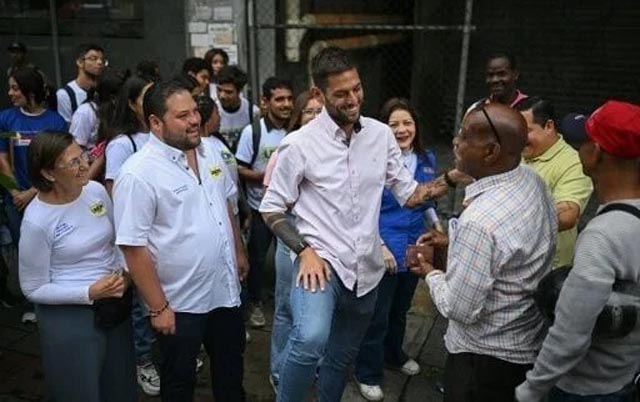News Flash

CARACAS, May 27, 2025 (BSS/AFP) - Divisions in Venezuela's opposition were laid bare Monday as it counted the cost of a ballot boycott that allowed authoritarian President Nicolas Maduro's party to sweep regional and parliamentary elections.
With the opposition virtually absent from the ballot, Maduro's United Socialist Party of Venezuela (PSUV) romped to victory in Sunday's vote for state governors and members of the National Assembly.
The party swept 23 of the South American country's 24 states and secured a parliamentary majority until 2031, according to provisional results from the CNE electoral authority.
Turnout was lower than for the July 2024 presidential election in which Maduro claims to have won a third successive term, but the opposition and much of the international community says he stole.
The CNE, accused of being under Maduro's thumb, put Sunday's voter participation at a little over 42 percent.
The main opposition group, led by popular figurehead Maria Corina Machado, had urged voters to stay away to avoid legitimizing a vote she described as a "farce."
But a smaller opposition faction, led by two-time former presidential candidate Henrique Capriles, opted to participate, arguing that previous boycotts had merely allowed Maduro to tighten his grip on power.
On Monday, Capriles, who won an assembly seat, lamented the landslide win for "Chavismo" -- the populist socialist movement founded by Maduro's firebrand predecessor Hugo Chavez.
"This was a predictable outcome. Abstention won, and with it the regime and those who promoted it," Capriles wrote on X, thanking opposition supporters "who went against the current" by casting a ballot.
Maduro's son, 35-year-old MP Nicolas Maduro Guerra, and First Lady Cilia Flores were among those to retain their assembly seats.
National Assembly president and key Maduro ally Jorge Rodriguez said the ruling party's coalition won 256 out of 285 seats in parliament, although the CNE had not released its final tally of results.
- Dozens of arrests -
The run-up to the election was marked by mass arrests and a fresh crackdown on dissent.
More than 70 people were arrested last week on suspicion of planning to "sabotage" the vote. They included opposition member Juan Pablo Guanipa, held on accusations of heading a "terrorist network."
Venezuela's government, which frequently alleges foreign-backed, opposition-led initiatives to topple Maduro, deployed more than 400,000 armed personnel on election day.
Caracas also suspended flight connections with Colombia and restricted border crossings.
"This victory is the victory of peace and stability for all of Venezuela," Maduro said after the vote. "Peace, peace, peace!"
Many opposition supporters said they could not countenance voting again after last July's showdown in which the CNE quickly declared Maduro the winner without releasing detailed results.
The opposition published its own tally from individual polling stations, showing a convincing win for its candidate Edmundo Gonzalez Urrutia.
A crackdown on post-election protests left 28 dead, hundreds behind bars, and saw worldwide condemnation of alleged rights abuses and lack of transparency around the results.
Machado said Sunday the opposition boycott had exposed the election as a "grand farce" and called again, in vain, on the armed forces to turn against Maduro.
Writing on X, Gonzalez Urrutia, who went into exile in Spain last year, said the boycott was a "silent but resounding declaration that the desire for change, dignity and a future remains intact."
- Vote in disputed region -
The election came as Venezuela's economy -- once the envy of Latin America, now in tatters after years of mismanagement and sanctions -- faces further turmoil.
US President Donald Trump has revoked permission for oil giant Chevron to continue pumping Venezuelan crude, potentially depriving Maduro's administration of its last lifeline.
Venezuela's regional elections, which for the first time included officials for Essequibo -- an oil-rich region controlled by neighboring Guyana but claimed by Caracas -- sent alarm bells clanging.
Guyana has administered the region for decades but Venezuela has threatened to partially annex it.
PSUV member Admiral Neil Villamizar was on Sunday named Essequibo's "elected" governor, despite the UN's highest court having ordered Caracas not to hold a vote for the region.
Balloting for Essequibo representatives took place in a micro-district especially created in Venezuela's Bolivar border state. There were no polling stations in Essequibo itself.